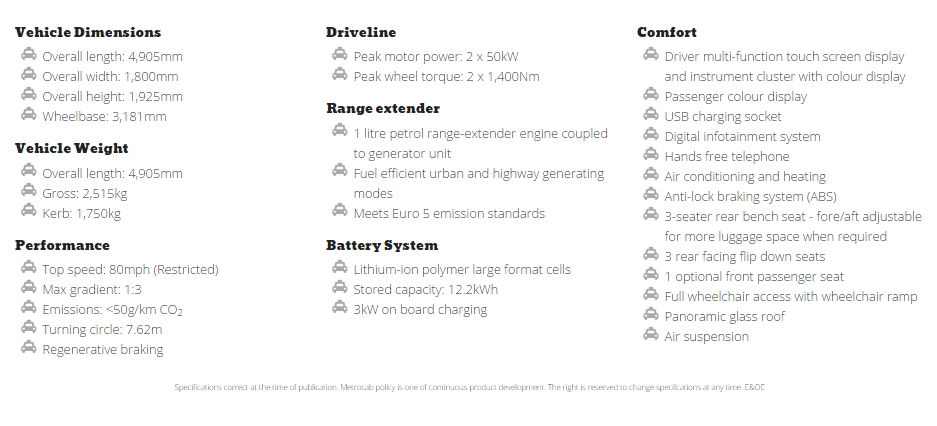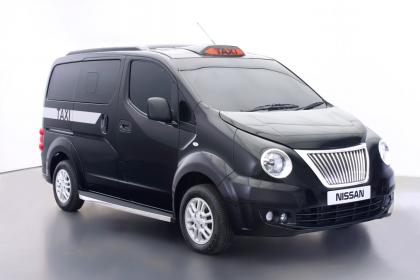So in our last blog we established that the amount of funding available for zero-emission black taxis is still to be confirmed. One thing is clear though, from 1 January 2018 no more new diesel taxis will be licensed.
But for any driver wanting to upgrade to a new vehicle after the zero emission capable deadline passes what will their options be?
In their latest update on the TfL website the regulator states –
“Three manufacturers are developing zero emission capable taxis, with the first vehicles expected to be available for purchase in mid-2017”
Metrocab

No new information has been released since last summer so the NewMetroCab.com website is clearly out of date. Worryingly for those hoping to have options to select from it states they’re still looking for a factory.
However, after a 7 month gap the @MateroCab twitter feed did resurface this with a picture of the vehicle on display at the Barcelona motor show.

The Tweet talks of in car connectivity but offers no firm information regarding price.
Back in May 2015 Chairman of Metrocab Sir Charles Masefield announced a £50 million funding for volume production of the all-new electric powered Metrocab at a site in Coventry. He stated that the aim was to be producing vehicles from 2016 after the prototype was trialed by ComCab.
Their parent companies owners Frazer-Nash Research and Ecotive haven’t responded to our requests for an update. It may be that production was delayed due to the long running court case with The London Taxi Company over the design of the new MetroCab.
Fortunately for their EcoCab business plan in January 2016 a high court judge ruled that the TX design was not unique. The LTC’s attempt to trademark the shape was deemed invalid.
The London Taxi Company
The LTC, owned by Chinese company Geely, is set to launch its TX5 model towards the end of 2017. After a fairly long period of silence it was announced that an additional £50 million of funding will be invested in the firm’s Coventry based facility. This amount tops up the original £250 million that the manufacturer pledged for the development.
https://www.youtube.com/watch?v=Pk_kL-uUh9c&feature=youtu.be
CEO Chris Gubby states that most of the engineering development of the TX5 is complete. All that remains is fine tuning the vehicle ready for production. It will be fitted with a plug-in power train along with a three cylinder petrol engine. The battery and electric motors will produce a pure-EV range of over 70 miles.
Design Director of Geely, David Ancona is confident that the TX5 will be priced as per the current model when government subsidies are taken into account. Although it attempts to maintain the iconic TX looks the vehicle will not be exclusive to the UK. Geely’s plans include rolling it out across European cities and using it as the basis for producing an electric van.
Mercedes
There’s not been a great deal of detail online about any plans Mercedes have for an electric plugin version of the Vito taxi. However the German company have just revealed at the Geneva Motor Show their new concept V-ision e model.
The Vision e promises a hybrid engine that delivers, ” 333 hp and a system torque of up to 600 Newton metres” and “standard consumption of under three litres of fuel per 100 kilometres.” The purely electric range is up to fifty kilometres and 0-60 mph in 6.1 seconds.
They have longed offered an electric van and plugin hybrid E and S class models. So logic dictates that transferring the tech over to a black taxi should be fairly straight forward and reliable.
Nissan EV200
This project was postponed indefinitely due to the manufacturers inability to hit the 0 emission requirements. Despite its emissions being considerably less than current eligible vehicles it couldn’t meet the regulator’s targets. The ultra modern exterior was also controversial. Not too many cabbies would have been crying over the news judging by their initial reaction to the design.
Charging point infrastructure
Once all these zero emission vehicles are on the roads will cabbies be able to charge them? TfL are working with suppliers to deliver 150 rapid charge points by 2018 and 300 by 2020 to, “support the electrification of taxis, PHVs and other commercial fleets.”
There are currently over 125,000 licenced taxi and private hire vehicles in the capital. Tfl are obviously expecting a slow take up rate otherwise even by 2020 it works out at 1 charge point to every 400 licenced vehicle. Hopefully these charge points will be off limits to members of the public? With charge times taking hours rather than minutes the queues for a plug are likely to be longer than at the ranks.
Conclusion
Most drivers thinking of upgrading to a new taxi vehicle in the near future are probably thinking of doing so before the Jan 1st 2018 deadline. By getting a Euro 6 compliant taxi before then they’ll be exempt from the changes for 15 years and can wait and see how the new technology performs.
By purchasing on a 3 year finance deal the diesel vehicle can be handed back at the expiry of the lease. If the plugin hybrid vehicles prove the doubters wrong they can swap over at this stage.
Alternatively if they’d rather stick with a diesel the balloon payment can be met and it’ll be eligible for a licence until 2032. Though they do face is missing out on potential grants if the plugin or scrappage schemes’ funding are withdrawn.

